Emerging from Dublin’s LGBT community, and cruising the tail end of a recession, the first AMI took place in Sides nightclub in 1987, run by Frank Stanley, Ross Elliot Tallon and Niall Sweeney. It didn’t take place again until 1996, three years after the decriminalisation of male homosexuality, at which point it moved to the Temple Bar Music Centre, before shifting to the Red Box a year later, and finally settling in the Olympia in 2000. Since then, the volunteer run event has raised over €335,000 to develop HIV/AIDS related programmes across the country, while also providing a platform for artists and audiences to explore the outer limits of their performance impulses and desires.
Modelled on Andrew Logan’s Alternative Miss World, the competition is structured around daywear, eveningwear and swimwear sections. Contestants are judged on the basis of poise, personality and originality by the panel of invited judges, and if they know what’s good for them, taking into account the vocal audience’s preferences too. Entrants put themselves forward for selection during the winter before the night takes place, and some finalists are admitted via regional heats. Since 2002, contestants have also been drawn from the Alternative Miss Philippines pageant, an offshoot event conceived by the city’s Filipino community which grew during the economic boom. People of all genders and sexualities are invited to compete, and the only obligation is to think outside the box; or better still, invent a new one.
According to this year’s call for entrants, the AMI seeks people to experiment with ‘ideas of beauty and gender through performance, wit, music, high-art, pop-clash, low-gutter - in fact, anything that you can possibly think to do on a stage.’ The pageant is as dedicated to collapsing distinctions between artistic disciplines and cultural values as it is to subverting gender and sexual norms: ‘AMI looks for quality, enthusiasm, insanity, strange beauty, outrage, and in particular, originality. The less likely that your act will be similar to other entrants, the more likely AMI will choose you to be an Aspiring Queen Cailín for the pageant of your lifetime.’
Although these might seem like high ambitions for an event that takes place only once a year, the ephemerality of the occasion is part of its appeal. Nonetheless, over the course of its lifetime, the AMI has left an impact on the Irish cultural landscape, not least of all on the fields of theatre and performance. In particular, it has played a significant role in the development of fringe and queer artistic practices and collaborative networks. The AMI has been a place where experimentation has always been the rule rather than the exception, and performers are given the opportunity to try out their weirdest and wildest ideas. Many people working in Irish theatre and performance today have been actively involved in the event’s organisation and production, and it has also accommodated artists and audiences not usually catered for in more conventional theatre and performance contexts.
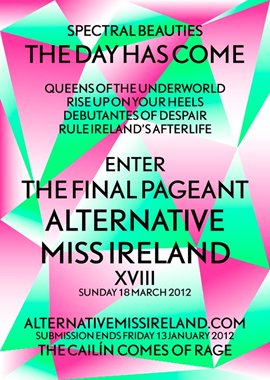 While the tone of the evening is typically ribald, the AMI has always been in tune which current social and political issues. Implicitly, the event mocks idealised notions of gender and sexuality which are deeply inscribed in Irish culture, particularly rigid constructions of women and morality, and iconic place-holders of virtue such as Cathleen Ní Houlihan and the Virgin Mary, not to mention commercialised competitions like the Rose of Tralee and Miss Ireland. The event takes place on St. Patrick’s Day weekend every year as an antidote to what has historically been an occasion for showcasing fairly staid depictions of Irish identity and experience. In her annual opening address, emcee Panti offers up a prayer to Dolly Parton, and welcomes everyone in the theatre to 'Gay Christmas', mischievously reimagining one of the most normative times of the year.
While the tone of the evening is typically ribald, the AMI has always been in tune which current social and political issues. Implicitly, the event mocks idealised notions of gender and sexuality which are deeply inscribed in Irish culture, particularly rigid constructions of women and morality, and iconic place-holders of virtue such as Cathleen Ní Houlihan and the Virgin Mary, not to mention commercialised competitions like the Rose of Tralee and Miss Ireland. The event takes place on St. Patrick’s Day weekend every year as an antidote to what has historically been an occasion for showcasing fairly staid depictions of Irish identity and experience. In her annual opening address, emcee Panti offers up a prayer to Dolly Parton, and welcomes everyone in the theatre to 'Gay Christmas', mischievously reimagining one of the most normative times of the year.
In addition to these subtle cultural subversions, the AMI has managed to address highly topical concerns with a frankness and immediacy not really achievable within the strictures of more mainstream theatre and performance production. While issues around LGBT rights and HIV/AIDS have remained to the fore, in recent years some acts have with dealt with matters surrounding the economic melt-down, and many continue to challenge the authority of the institutional church. For example, writer and performer Neil Waktins’ act Heidi Konnt, which won the competition in 2005, included a fearless attack of Pope Benedict for his condemnation of homosexuality, and striking a different tone, Ciarán O’Keeffe’s Smilin’ Kanker won the contest in 2009 for uniting the crowded auditorium with an oddly nostalgic rendition of the funeral hymn 'Be Not Afraid'. 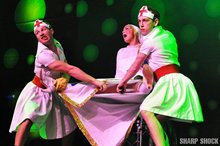 In 2010, actor Louise White’s act Decada De Rosary included a decidedly unvirginal birth to the tune of Leo Sayer’s 'Thunder in My Heart'.
In 2010, actor Louise White’s act Decada De Rosary included a decidedly unvirginal birth to the tune of Leo Sayer’s 'Thunder in My Heart'.
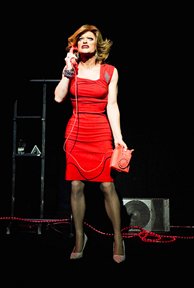 The AMI has been an especially important forum for the development of Rory O’Neill’s drag persona Panti, who has hosted the show since 1996. In addition to regularly performing at pubs and clubs for the nearly two decades, including at her own pub Pantibar, in the past five years Panti has also staged a trilogy of solo shows including In These Shoes (2007), All Dolled Up (2007) and A Woman in Progress (2009), which was programmed as part of the Dublin Theatre Festival. It was the AMI that first propelled Declan Buckley’s act Shirley Temple Bar into the public eye, after winning the competition with a ribbon gymnastics routine in 1997. Watkins’ victorious Nazi inspired drag creation Heidi Konnt ended up being the central inspiration behind two of his recent stage works - The Dark Room (2008) and The Year of Magical Wanking (2010), which is currently touring Australia.
The AMI has been an especially important forum for the development of Rory O’Neill’s drag persona Panti, who has hosted the show since 1996. In addition to regularly performing at pubs and clubs for the nearly two decades, including at her own pub Pantibar, in the past five years Panti has also staged a trilogy of solo shows including In These Shoes (2007), All Dolled Up (2007) and A Woman in Progress (2009), which was programmed as part of the Dublin Theatre Festival. It was the AMI that first propelled Declan Buckley’s act Shirley Temple Bar into the public eye, after winning the competition with a ribbon gymnastics routine in 1997. Watkins’ victorious Nazi inspired drag creation Heidi Konnt ended up being the central inspiration behind two of his recent stage works - The Dark Room (2008) and The Year of Magical Wanking (2010), which is currently touring Australia. 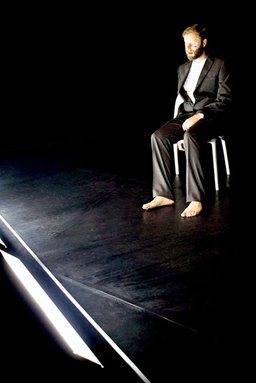 The current reigning Alternative Miss Ireland is Mangina Jones, the alter-ego of Cian O’Brien, who went on to host a series of cabaret style gatherings at the Project Arts Centre last summer with Jen Coppinger, before assuming the Artistic Directorship of the same theatre in the Autumn.
The current reigning Alternative Miss Ireland is Mangina Jones, the alter-ego of Cian O’Brien, who went on to host a series of cabaret style gatherings at the Project Arts Centre last summer with Jen Coppinger, before assuming the Artistic Directorship of the same theatre in the Autumn.
The roots of these rich contemporary connections extend deep into be the cultural terrain of the 1990s. Annie Ryan recalls how the birth of The Corn Exchange in 1995 was intimately linked to the founding of the AMI. In 1993, Tonie Walsh, who was involved in running the event, approached Ryan and other artists to perform in his club Elevator at the Ormond Multi-Media centre. It was here that Ryan first experimented with her physical theatre techniques. As a result of this relationship, Ryan’s company performed at the AMI in 1996 and 1997, including a performance based on Swan Lake. In 2000, Ryan was a judge at the event, and was instrumental in helping Watkins’ discover Heidi Konnt’s image with commedia dell’Arte make-up, even performing as part of the heaving ensemble. She wryly remarks: ‘I was slightly insulted that there were about nine other bitches in his hareem but there was no point in arguing about who was top queen that night.’
Ryan fondly remembers some of the cross-disciplinary work that took place in Dublin at the time: ‘Dublin in the 90s broke the mould across many art forms and ways of life. The city was transforming, and the people creating the nightclub scene and the alternative theatre scene converged – we are natural partners. Many collaborations and partnerships formed and made radical and excellent performance, graphic design, even business models.’ Ryan’s reflections on the collaborative artistic ethos at the heart of the AMI is echoed by founding member of the organising team, Niall Sweeney: 'The most striking thing is the absolute commitment and generosity of everyone involved, and I think that is her greatest achievement and impact. This enormous unfettered alternative Irish family that has come into being, and the ecstatic giddy joy that it creates in the collaborative making of something so generous, so good.'
Also joining the steering committee in the mid 90s, Rory O’Neill quickly discerned that there was a sizable Irish demographic craving performance events which were not available in either club or mainstream theatre spaces, arenas in which he has experience as a promoter and performer: ‘I saw that there was an audience that - for the most part - were not served by the traditional theatre and the regular theatre companies. Or if they were, they weren't likely to access it.’ His observations of audiences prompted him to develop his own act and bring it into more conventional theatre spaces a decade later.
The flow of influence was very much two-way, for O’Neill. The AMI may have enlivened theatre and performance culture over time, but professional theatre makers greatly shaped the AMI: ‘People who started out with us in the beginning as chancers became professional in their industry and every year moved things up a scale, and we gathered other professional as we went, and soon something that started out with us all running around trying to do everything ourselves, muddling through, became a slick operation with each aspect looked after by professional in that field. I guess I saw that benefits of a more collaborative, more professional approach - in other words the benefits of the traditional theatre model.’
Recounting the early years of the pageant, Director of The Lir Loughlin Deegan remembers feeling that many of the artists involved, such as O’Neill and Sweeney, ‘were actually the brightest and the best [...] arguably the most progressive and intelligent performance artists working in Dublin at the time.’ He also recalls how people working in theatre at the time quickly recognised this and attempted to harness this creativity, such as Ali Curran when she became Director of the Dublin Fringe Festival in 1997.
The AMI is as old as the Dublin Fringe Festival, and its current Director Róise Goan attests to the impact the event has had on Irish theatre and performance throughout its lifetime. Goan stresses the benefit of looking at the small shifts we have seen in arts practice throughout the last two decades: ‘While you can obviously point to drag artists like Panti and Heidi Konnt making repeated transitions between club and theatre contexts, I am more interested in the subtle sea change we see in Irish performance that those artists and others precipitated; the fabulous celebration of alternative lives, be they queer or not, the joyous appropriation of what has come before, transformed into something new, and the courage to be seen, to be present and be laid bare, with the aid of a little glitter and some great lippy.’
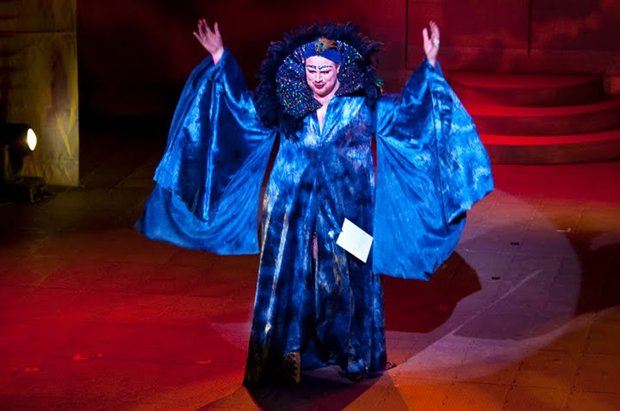
While Goan cherishes many memories of the AMI, her stand out highlight was when friend O’Brien won the title last year: ‘Having witnessed many iterations of ‘River Deep Mountain High’ performed by Cian O'Brien over the past 11 years, seeing Mangina shake it down in her best ever performance in front of over a thousand people was incredible. I actually thought my heart would burst with pride. Which is what AMI is all about really, isn't it?’ True enough, for most people the AMI amounts to a celebration that illuminates how performance can be socially and politically engaged, as well as affirming and fun.
Since winning the competition, O’Brien has primarily enjoyed the numerous opportunities he has been given to perform. As the holder of two esteemed titles – the Alternative Miss Ireland and Artistic Director of Project Arts Centre – in many ways O’Brien embodies the border between alternative and institutional performance worlds. The current appeal of this dual identity is no more evidenced than in his invitation to host the Irish Times Irish Theatre Awards at the end of February this year. O’Brien delights in the revelry of the AMI, but he also senses the symbolic importance of his title: ‘I also think it’s a great statement that the Artistic Director of Project Arts Centre also plays a character who is a reigning beauty queen!’
Like Goan, everyone has their favourite memories of the AMI, usually involving old friends - many of whom cross the globe especially - as well as provocative new performers. For me, it has to be Watkins’ spine-tingling victory performance of The Show Must Go On when he returned his crown in 2006, accompanied by Glória, Dublin’s Lesbian and Gay Choir. [See panel for youtube clip] For Deegan, Shirley Temple Bar’s win remains a highlight, for managing to capture the excitement of the time when the country was on the brink of so much change: ‘She will be forever 12 in my eyes and everybody since has simply borrowed her crown for a year. Pity, maybe, that she - like us all - has had to grow up!’
The AMI’s core team is equally conscious of the passing of time, and keen to call it a day before the format goes stale, and allow a new generation to find its own way of responding to the times we live in. As Sweeney jubilantly states: ‘Though we may be of the past, we are not about it. Never look back! AMI is catharsis. The expiration of shame and hubris. The burning-up of the 'now'. At the same time, the core group hope to explore new ways of fundraising, and hopefully carry on the spirit of the event in other ways. Whatever happens, Sweeney asserts that the AMI has always championed ‘the transformative power of having fun,’ cautioning that we should never underestimate this value.
The AMI collective’s decision to call it a day raises some interesting questions about the future life of queer performance in contemporary Ireland, particularly now that many of the original social and political aims of LGBT movements have been achieved, such as the decriminalisation of homosexuality and the introduction of the Civil Partnership Bill in 2011. Dublin is now a city that has two gay theatre festivals – The International Dublin Gay Theatre Festival (2004-) and the Absolut Gay Theatre Festival Dublin (2010-). But for many of the people I spoke to, the AMI’s legacy is most clearly transmitted in the work of THISISPOPBABY, the company run by Jenny Jennings and Phillip McMahon, that has consistently worked with artists linked to the event. Such was the case with Queer Notions, a festival of queer art and performance which took place at the Project Arts Centre in 2009 and 2010, as well as with Werk a season of performance-club nights which took place in the Peacock bar during 2010. According to McMahon, ‘the crazy/sexy/frenetic aesthetic that explodes onto the Olympia stage is also something we have adopted on many occasions [...]You only have to look to the number of theatre practitioners that have entered (and won) AMI to see how easily the two worlds sit together.’
McMahon continues to suggest that without the AMI, his company’s musical Alice in Funderland, set to take place on the main stage of the Abbey next month, would never have come into being. Viewed optimistically, this occasion might be taken as a sign that the line between the queer fringe and straighter mainstream is less defined than ever, and that both traditions are at a good place when it comes to finding productive ways of exciting and energising each other.
Fintan Walsh is Lecturer in Drama, Theatre and Performance at Queen Mary, University of London. His book Queer Notions: New Plays and Performances from Ireland was published by Cork University Press in 2010